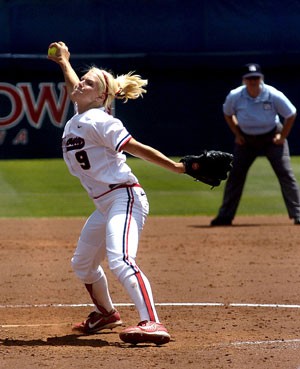The Arizona softball program has prided itself on its constant production of outstanding pitchers – maybe a more applicable name for Arizona is “”Pitcher U.””
From Jennie Finch to Alicia Hollowell to Taryne Mowatt, pitching has typically been the cornerstone of the Wildcats’ successful history. And last year was no exception.
In last year’s postseason appearance, Mowatt threw every pitch for Arizona, including seven games in eight days in the Women’s College World Series, totaling more than 1,000 pitches.
Mowatt wouldn’t have it any other way.
“”I think (pitching almost every game) is the way I would rather have it. I like to have the ball,”” said Mowatt, who set Arizona single-season records in wins, innings pitched and strikeouts last year while being named the WCWS Most Outstanding Player.
“”Sometimes I think to myself that it would be nice to get a game off, but I know if I were actually to get the game off I would be on the bench asking to get into the game.””
Arizona interim head coach Larry Ray said it is possible for Mowatt to get games off during the season depending on how freshman Lindsey Sisk progresses throughout the year.
Of Arizona’s 65 games last season, there were only five that Mowatt didn’t appear in, a pattern Ray said would most likely mirror this year’s pitching outline.
“”If (Sisk) performs the way that we think she can, it will take a lot of the load off Taryne,”” Ray said. “”On the other hand, it is nice to know that Taryne is capable of doing that if we need her to.
“”The key with Taryne, especially last year, was that she was in very good shape. … It is going to be crucial that she is able to keep her lower body in shape again.””
It usually isn’t advised to make changes to a successful system, but after pitching coach Nancy Evans left the team in December, the Wildcats had no choice.
The Wildcats hired Gale Bundrick as the their volunteer assistant pitching coach in Evans’ absence – but there is still a major void left with her loss.
“”One of the biggest things I am trying to prepare for now is scouting and going through all the teams that we are getting ready to play,”” Bundrick said. “”It doesn’t give you much time to get ready for those games and I am working diligently to prepare myself.””
But with the primary pitch caller Evans gone, the Wildcats will turn to catcher Callista Balko to signal in her own pitchers for the first time in her collegiate career.
“”It is totally different than it has been for the last three years because Nancy called all of the pitches the last three years so it will be definitely be something new,”” said Balko, who has caught every pitch over the last two years, adding up to a total 877.1 innings. “”I have a very good concept of the game by this point as a senior and if Taryne is on the other side she will shake me off no doubt if she isn’t comfortable.
“”It is kind of better from the catcher’s standpoint to call the pitches because you can see which pitches are moving and you can tell where the batter is standing in the box and (the coach) can’t see that from the side, so it is better to have the catcher call it.””
The hope is that Bundrick has caught on enough to Evans’ style where she could effectively call the pitches on her own. Ray said they will have meetings before every game to discuss the upcoming pitching strategy.
But the most important factor is the bond Balko and Mowatt share. In order for the new pitching system to work, both players must be on the same page – something the two seniors say will not be a problem.
“”(Balko) could probably tell you what was going to be called before she was given the sign in the game (last year) and she has definitely picked up on the pattern,”” Mowatt said. “”We kind of have to work together so we have that pitcher-catcher bond. We know how each other are in a game situation or a practice setting, so I would say we are pretty close.””









